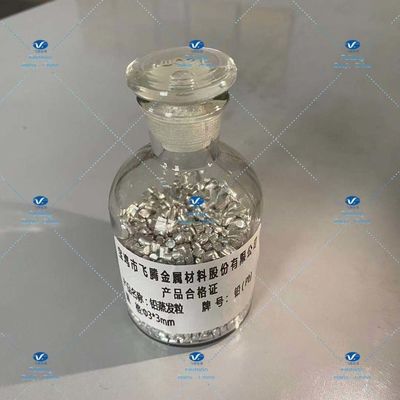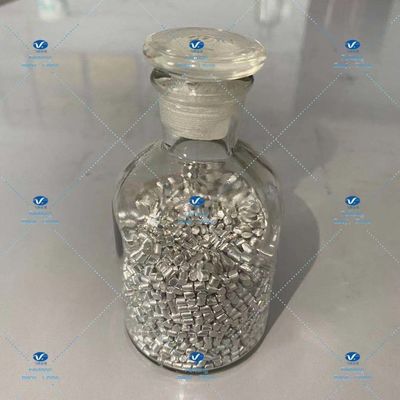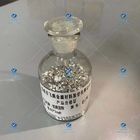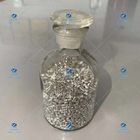High Density Lead Granules 3*3mm Metal Lead Evaporation Pellet
| Place of Origin | Baoji, Shaanxi, China |
|---|---|
| Brand Name | Feiteng |
| Certification | GB/T19001-2016 idt ISO9001:2015 GJB9001C-2017 |
| Model Number | lead Evaporation Pellets |
| Minimum Order Quantity | To be negotiated |
| Price | To be negotiated |
| Packaging Details | Vacuum package |
| Delivery Time | To be negotiated |
| Payment Terms | T/T |
| Supply Ability | To be negotiated |

Contact me for free samples and coupons.
Whatsapp:0086 18588475571
Wechat: 0086 18588475571
Skype: sales10@aixton.com
If you have any concern, we provide 24-hour online help.
x| Size | φ3*3 | Port Of Delivery | Xi'an Port, Beijing Port, Shanghai Port, Guangzhou Port, Shenzhen Port |
|---|---|---|---|
| Material | Lead | Packaging | Vacuum Package |
| Brand Name | Feiteng | Certification | GB/T19001-2016 Idt ISO9001:2015 GJB9001C-2017 |
| Place Of Orgin | Baoji, Shaanxi, China | ||
| Highlight | High Density Lead Granules 3*3mm,Feiteng Lead Granules,3*3mm Metal Lead Evaporation Pellet |
||
lead 3*3 Evaporation Pellets Packaging Vacuum Packaging
| Port of delivery |
Xi'an port, Beijing port, Shanghai port, Guangzhou port, Shenzhen port |
| Material | lead |
| Size | φ3*3 |
| Packaging | Vacuum Packaging |
Metal lead is a kind of corrosion resistant heavy non-ferrous metal materials, lead has the advantages of low melting point, high corrosion resistance, X-ray and γ ray is not easy to penetrate, good plasticity, etc., is often processed into plate and pipe, widely used in chemical industry, cable, battery and radioactive protection and other industrial departments. The crystal structure of lead is cubic lattice. Lead density, small hardness, low melting point, high boiling point, conduction of electricity and heat is poor, can absorb radiation, so used in the manufacture of radioactive material containers and used as protective materials. Lead is used as a raw material for batteries, cables, bullets and ammunition, and as an additive to gasoline. Lead compounds are used as raw materials for pigments, glass, plastics and rubber. Due to its excellent acid and alkali corrosion resistance, lead is widely used in chemical and metallurgical equipment. Lead alloys are used as bearings, movable type gold, solder, etc. In addition, lead has opened up new uses. Such as used as asphalt stabilizer to extend the service life of the road surface; For nuclear power plant shielding and nuclear waste storage tanks, high-power battery packs for load adjustment in the electrical sector, and magnetic fluid dynamics devices. Lead pipe is also a major aspect of lead materials, numerous applications in the chemical industry and drainage pipes. Seamless tubes are extruded from chemical lead or lead containing 6% antimony. In the construction of lead materials, in addition to the use of lead plate, pipe, solder and used for plugging lead mesh; A significant portion of the above lead-tin solders, as low melting point fusible alloys (alloys of lead with tin, bismuth, cadmium, indium, etc.), are almost all wire. The lowest melting point of the latter is below 100℃, used for automatic arc extinguishing, electric fuse, boiler embolism, etc. In developed countries, lead has become an independent source of consumption, particularly in Britain, where lead skin was used as roofing to protect against radiation from the atmosphere's atoms. However, the production of lead in China is very small, the annual output of about 10,000 t. With the improvement of people's life, lead material is likely to become one of the main consumption uses of lead. The main casting materials of lead are bearing alloy and type alloy; Cast products include bearings, type plates, counterweights, seal gaskets, warheads, ballast counterweights, and even integral castings of radiation protection layers for large nuclear power plants.
Advantage:
1. The low melting point
2. High corrosion resistance
3. Good plasticity
4. The density is big
5. Hardness is small
6. High boiling point
7. Poor conductivity to electricity and heat







